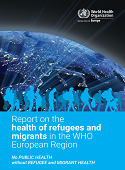
This report by the World Health Organization’s (WHO) Regional Office for Europe provides a base of evidence to assist European countries and stakeholders in promoting refugee and migrant health. It provides an overview of evidence, trends, and policies related to refugee and migrant health in the European region, followed by strategies and recommendations to improve health care for refugees and migrants.
The report finds, inter alia:
Health outcomes
- It can be difficult to generalise refugee and migrant health. Factors that can impact health outcomes include the effects of the migratory process, social determinants of health, and risks and exposures in origin, transit, and destination environments. These factors interact with biological and social factors, leading to different health outcomes.
- There is considerable variation in the prevalence of mental disorders in refugees and migrants. Poor socioeconomic conditions are associated with an increased risk of depression among resettled refugees.
- Male migrants experience significantly more work-related injuries than non-migrant workers.
- Female refugees and migrants show worse outcomes with respect to pregnancy-related indicators. Characteristics of the host country, like having a strong integration policy, can play a key role in reducing the likelihood of these negative outcomes.
- Knowledge of family planning is varied among refugees and migrants.
- Refugee and migrant children may be more likely to have diet-related health issues (both malnutrition and overweight/obesity). Migration is also a risk factor for mental disorders in children, and unaccompanied minors experience higher rates of depression and symptoms of post-traumatic stress disorder than other refugee and migrant groups.
Health systems
- A 2018 survey of the member countries of the WHO European Region showed progress in planning and policy development to meet the needs of refugees and migrants. However, there is a lack of reliable, comparable, and nationally representative data on refugee and migrant health.
- Planning for refugee and migrant health services is best achieved by building on existing health system policies and infrastructure to ensure that refugees and migrants have routine access to regular health services, avoiding parallel health services to the extent possible. However, this implies that existing health systems will need to be more sensitive and friendlier to the needs of refugees and migrants.
A summary of the report is also available.
Details
- Authors
- World Health Organization, Regional Office for Europe
- Geographic area
- International
- Contributor type
- International organisation
- Original source
- Posted by
Related content
2025 IMISCOE Spring Conference
The 2025 IMISCOE spring conference will take place on 17 – 19 March 2025 in Krems, Austria, and online. The title / topic of the conference is " The
Portugal: Presentation of report on hate speech and immigration
On 3 February Casa do Brasil de Lisboa will present the 5th report of the MigraMyths project. The theme of the report is hate speech and immigration
Hungary: How to effectively help Ukrainians
BONA FIDE Foundation is organising a workshop to equip volunteers and organisations in Hungary with the tools and knowledge necessary to effectively
Slovakia: Local governments and the integration of refugees and migrants
The Centre for the Research of Ethnicity and Culture (CVEK), in collaboration with UNHCR, is organising a conference entitled " Local governments and
Mental health of people with migration and refugee backgrounds in a changing Europe
The European Psyciatric Association (EPA) is organising a webinar on the complex mental health challenges faced by people with migration and refugee
